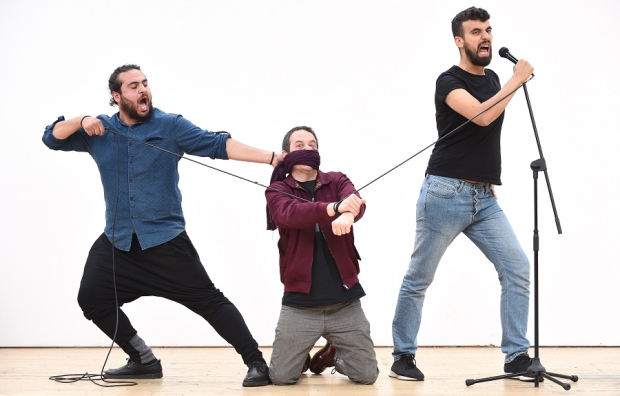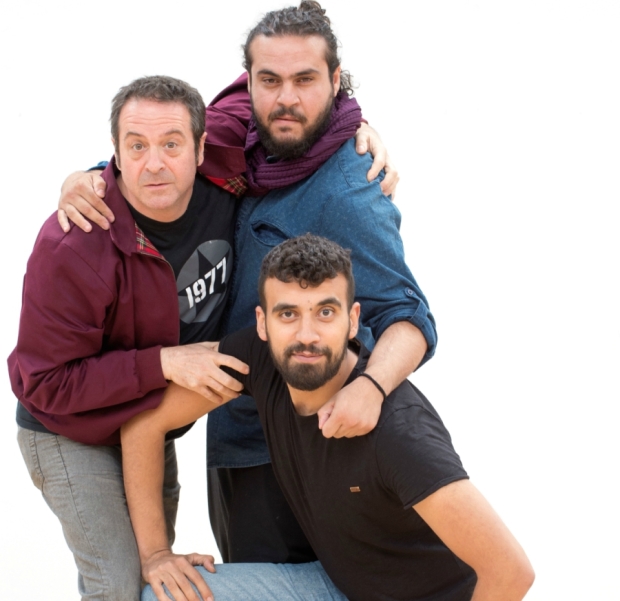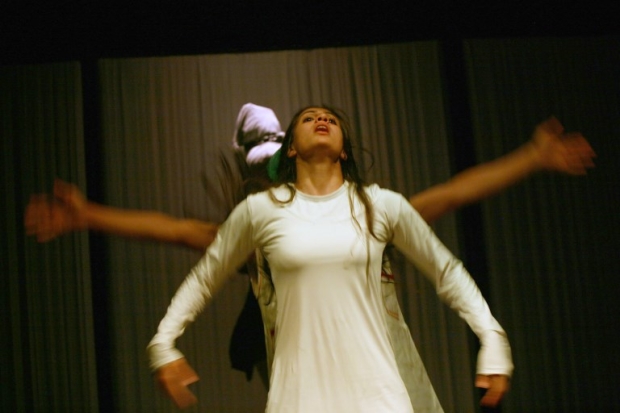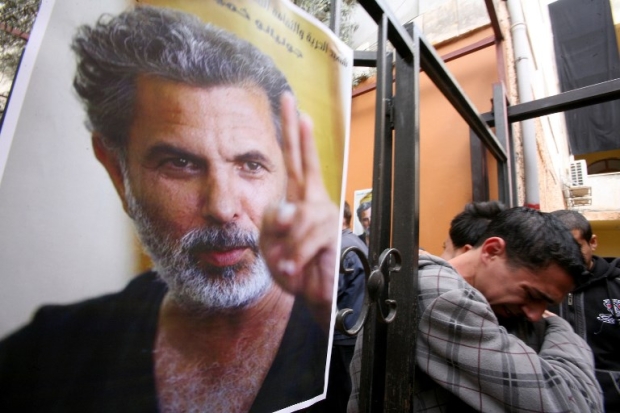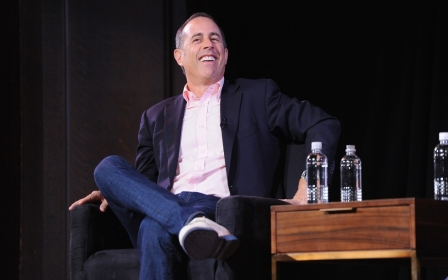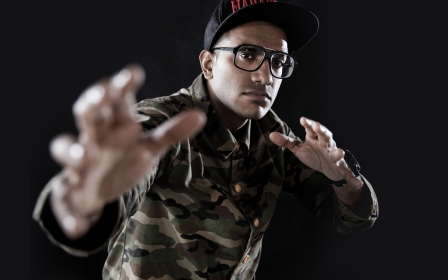What’s so funny about the Israeli occupation? Ask these comedians
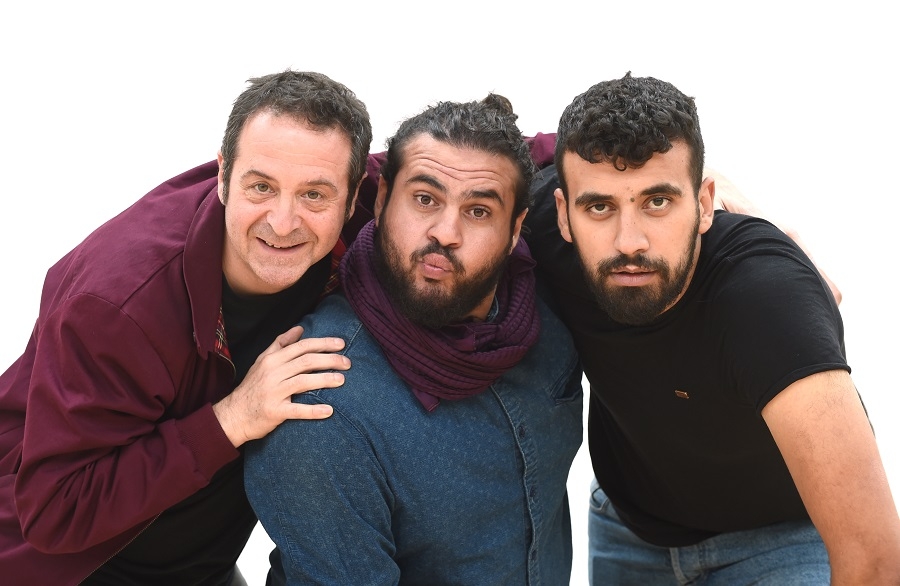
LONDON - Have you heard the one about the two Palestinian actors and the British political comedian? You soon will.
At the end of January, Showtime From the Frontline is starting its tour across Britain, bringing this newly formed trio, led by its veteran troublemaker in chief, Mark Thomas, to a theatre near you, turning that unlikely subject for comedy – the Israeli occupation – into its main act.
Every time you travel around, you go to America, to the UK, as an artist, suddenly there is a stereotype about who you are: you are a terrorist or a victim
- Alaa Shehada
When I meet them, the three performers have just finished a day’s rehearsal in a studio in east London’s Stratford Theatre Royal. The historic venue’s regal name belies the fact that it is a much-loved centre for “people’s theatre,” rather than anything aristocratic or elitist.
And it’s just the place for a radical comedian like Thomas, working together with two talented Palestinian refugees determined to overturn stereotypes about themselves and their situation by using comedy.
Breaking stereotypes
Thomas, who is known for his solo shows, says mischievously: “For me, I think one of the challenges is allowing other people on the stage.”
Abualheja hits back: “We are trained in Palestine after 60 years of occupation; we know how to deal with someone like this. And still we insist on him to apologise about Balfour, but he didn’t.”
We insist on him to apologise about Balfour, but he didn’t
- Faisal Abualheja
“I have apologised, every f**king day,” replies Thomas, referring to the British declaration of 1917, which paved the way to create a Jewish homeland in Palestine.
Raucous laughter breaks out frequently during our conversation.
"That’s the picture you’ve got, so we are trying through this show to humanise the story, to remind people that we as Palestinians are human," he adds.
Shehada and Abualheja, both refugees from the West Bank who trained at Jenin Freedom Theatre, have worked with international clown group Red Nose International in Palestine, visiting hospitals to entertain sick children.
Last year, Shehada and others started their own troupe called Palestinian Laughter Liberation, which he says brings comedy into the frame of politics in the occupied territories.
Abualheja sees the UK show as creating a new language of laughter to overcome the barriers between people and culture.
“In this show there are different cultures, different stories, different languages – this meeting together as artists is like, maybe, that laughter is our language; theatre is our language," he says. "I think this is the powerful thing.”
The show is performed in English and Arabic, with English surtitles.
'It's not easy'
The show came together out of a comedy workshop which Thomas, a long-time supporter of Palestinian solidarity, and collaborator Sam Beale, who teaches standup at Middlesex University, held last year at the Jenin Freedom Theatre.
Thomas explains: “Our philosophy was we weren’t going to tell anyone what to say. What we were there to do was teach people some skills they may not have, in order that they can say what they want.”
Out of the workshop, Shehada and Abualheja put on their own comedy night during Ramadan at the theatre.
“We invited all the people after their fasting. We started at nine and it went for three or four hours,” says Shehada. “It was really great,” adds Faisal.
But doing comedy in the occupied West Bank has its challenges, explains Abualheja.
“It’s not easy because first there are many challenges, as an artist has all over the world, which is to find a job; but in Palestine there are different challenges – to find a job, yes, but to struggle with the community around you, then to struggle with the occupation.
“Like for example, many times I want to go and perform in Bethlehem but we get stopped at the checkpoints and we can’t perform there, so we cancel the performance.”
We are trying through this show to humanise the story, to remind people that we as Palestinians are human
-Alaa Shehada
The places they need to perform in are in Israel, such as Haifa, and Jerusalem, which is under Israeli control, says Shehada, adding, “We want to meet our own Arabic audience. But we cannot because we don’t have permission to go there.”
“Another challenge is the NGOs, the funding,” says Abualheja, “there is a system around you which is like the second occupation, or the fourth occupation. It’s like everything in the country, all Palestine becomes a big NGO organisation. There is nothing coming from inside.”
The lack of indigenous funding for the arts and lack of venues makes it hard to find opportunities to perform or get paid work as actors or stand-up comics in the West Bank, says Abualheja, so they have to depend on international NGOs.
This is the same problem Palestinians in the West Bank face in all areas of life, with obstacles at every step imposed by occupation, he adds.
“For example, Palestine is a community of farmers, but it is not allowed for any farmer to dig a well for water – this is illegal, the Israelis will come and you will pay a lot of money and they will close it with concrete. So this is what keeps the mentality of waiting for the money from outside.”
Off limits
Much of their homeland is also off limits to the actors, including the capital Jerusalem that US President Donald Trump decided in December belonged to Israel. Most world leaders disagreed.
“Five months ago I got an invitation to be in the US for a clown workshop. The consulate is in Jerusalem. I have to go to apply there for a visa but I cannot go. Then I spoke to the Americans and the Americans send papers to the Israelis and then the Israelis send papers for me,” Shehada says speaking in a frenetic voice that speeds up until the words meld together, reflecting the bureaucratic madness of being a Palestinian trying to get on with his life.
Many times I want to go and perform in Bethlehem but we get stopped at the checkpoints and we can’t perform there
- Faisal Abualheja
“Then after I waited for two weeks, I get permission to be in Jerusalem for six hours, by an invitation from the States to be in my homeland,” Shehada adds.
But the problems for Palestinians do not end at the Israeli border.
Shehada himself nearly didn’t make it here for the rehearsals thanks to the UK's Byzantine and outsourced visa system. “We would love to come to the UK to do workshops and schools and performing, but one of the main problems is visas. It was a nightmare this time. It was a last minute decision. And finally thank God they let us come.”
Shehada’s visa took six weeks instead of the expected three weeks.
Thomas then proceeds to tell a real-life shaggy dog story of the bizarre series of bureaucratic hoops that faced Shehada before and after he arrived in Britain, involving police stations, biometric cards and very expensive phone calls to the private visa company.
“What Alaa and Faisal are describing is just the stupidity of handing over these functions of the state to outsourced companies.”
Palestine at heart
Thomas has been on the frontline of British political comedy since the genre had its first punk-inspired Dr Marten boots-wearing outing in the 1980s. More recently he has focused on political writing as well as touring, but over the years one struggle has remained close to his heart: Palestine.
In 2009, he made a typically quixotic decision to bring the spotlight to Israel’s apartheid wall by walking along it, a feat that was met with misunderstanding and obstruction.
The Freedom Theatre attracted hostility both from Israel and some in Palestine who objected to its radical approach to training actors from the Jenin refugee camp and putting on international works.
I remember my brother saying if we brought a hundred politicians to talk about Palestine it would not be as powerful as this [show]
- Faisal Abualheja
Meir Khamis was gunned down by an unknown assailant in 2011, but despite this shocking act of violence, and attempts to burn it down, the theatre lived on.
Meir Khamis’s killing highlighted the challenges of what Abualheja calls Palestinian’s own “internal occupation”.
“You have the authorities, the society, Islam - things that you cannot [talk about],” says Shehada. “You have many rules that were [set] by the old generations and it’s very difficult to touch them. So those things you fear."
After all of the trials, the two Palestinian actors are here and Showtime from the Frontline is happening. Abualheja is optimistic.
“What I think is that we don’t have to convince everybody, because otherwise we would be lost in trying to convince people. Let’s do what we like, let’s have fun with it, and then they will come. That’s what happened to my family," he says.
"I remember my brother saying if we brought a hundred politicians to talk about Palestine it would not be as powerful as this [show]. We are a conservative family. We are refugees. We live in a camp.
"So you see, there is hope."
*Showtime From the Frontline begins touring in the UK on 30 January until 21 April, details: markthomasinfo.co.uk
This article is available in French on Middle East Eye French edition.
Middle East Eye propose une couverture et une analyse indépendantes et incomparables du Moyen-Orient, de l’Afrique du Nord et d’autres régions du monde. Pour en savoir plus sur la reprise de ce contenu et les frais qui s’appliquent, veuillez remplir ce formulaire [en anglais]. Pour en savoir plus sur MEE, cliquez ici [en anglais].


